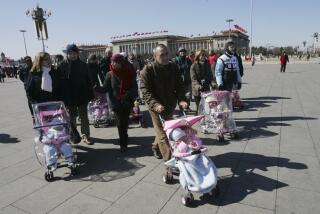U.S. Alters Rights Policy Toward China
- Share via
WASHINGTON — The Clinton administration has decided to drop an eight-year campaign to persuade the United Nations to condemn China’s human rights record, a senior administration official said Friday.
“China’s human rights record has been, is and--as long as we are here--will be a central element of our relationship with China,” insisted the official, who spoke to a small group of reporters on condition that he not be identified.
However, he said, the administration has concluded that the American campaigns in the United Nations proved an ineffective way of achieving progress on human rights.
Every year since the 1989 crackdown on pro-democracy demonstrations in Tiananmen Square, the U.S. has sponsored or endorsed a resolution criticizing China at the annual session of the U.N. Commission on Human Rights.
These resolutions never passed, although the 1995 version fell short by a single vote. This year, the senior official said, the U.S. will not sponsor a condemnation of China at the U.N. session that opens in Geneva next week, although it might do so at some future date.
“That’s ludicrous,” Mike Jendrzejczyk, the Washington director of Human Rights Watch/Asia, said Friday when told of the administration’s claim that the U.S. effort might someday be revived.
He said the American campaign in Geneva “is finished.”
Rep. Nancy Pelosi (D-San Francisco) termed the administration’s decision “shameful. . . . It is no surprise that this decision was put out, once again, late on a Friday afternoon, when there can be little public attention to it. Perhaps the Clinton administration itself is ashamed by this decision.”
The administration’s action represents the second broad reversal in its approach for obtaining human rights improvements in China.
During his 1992 presidential campaign and during his first year in the White House, President Clinton sought to prod the Chinese regime to ease political repression by threatening to restrict its most-favored-nation trade benefits.
In May 1994, the president abandoned this approach in the face of determined opposition from the American business community.
At that time, the administration said it would seek progress on human rights through other methods, such as working with other governments instead of unilaterally.
Since then, the administration focused on the annual effort to obtain U.N. condemnation of the Beijing regime, turning it into one of the cornerstones of U.S. human rights policy for China.
The American campaigns forced China to engage in intense, worldwide diplomacy to line up governments that would oppose the U.N. resolution. Now this multilateral approach is also being scuttled.
Two factors underlie the administration’s decision.
First, the multilateral campaign fell apart a few weeks ago when European governments announced that they will no longer support a resolution condemning China. That left the United States to go it alone.
The Geneva resolutions “failed by larger margins every year,” explained the senior administration official Friday, apparently referring to the years after 1995.
Second, over the past few weeks, the Clinton administration appears to have bargained away its broad-gauged U.N. effort in exchange for a couple of specific Chinese concessions on human rights.
On Thursday, Chinese Vice Premier Qian Qichen announced that China will agree to sign a U.N. Covenant on Civil and Political Rights. That would put China formally on record in favor of freedom of expression, assembly and religion. However, China has said in the past that it has its own interpretation of what these concepts mean.
In a bit of last-minute diplomacy, the White House on Friday reportedly dispatched James R. Sasser, who is U.S. ambassador to China, to confirm that the agreement to sign the U.N. covenant is firm.
In addition, White House officials hinted broadly that China will soon release some political dissidents in an implicit exchange for the administration’s dropping of the U.N. resolution.
Soon after Clinton held a summit meeting with Chinese President Jiang Zemin in Washington last October, the Chinese regime freed Wei Jingsheng, the country’s leading proponent of democracy, who had served most of the past 19 years in prison.
“I think there will be further releases of political prisoners,” the senior administration official predicted Friday.
Clinton and other administration officials said this week that the president is likely to visit China in late June.
On Thursday, the Senate voted 95 to 5 in favor of a nonbinding resolution urging the administration to go forward with the annual U.N. resolution criticizing China’s human rights performance.
Meanwhile, Clinton administration officials sought Friday to minimize the importance of disclosures that Iran sought within the past few months to buy key nuclear materials from China. Any such transaction would have violated Chinese promises last fall to halt all nuclear cooperation with Iran.
The Iranian approach was made to “a relatively low-level official,” they said. As soon as the U.S. contacted top-level officials in Beijing, they gave assurances that no such sale to Iran will take place. What China did “reflects a willingness by the Chinese government to abide by the agreement” to stop selling nuclear equipment to Iran, one administration official said.
More to Read
Sign up for Essential California
The most important California stories and recommendations in your inbox every morning.
You may occasionally receive promotional content from the Los Angeles Times.













